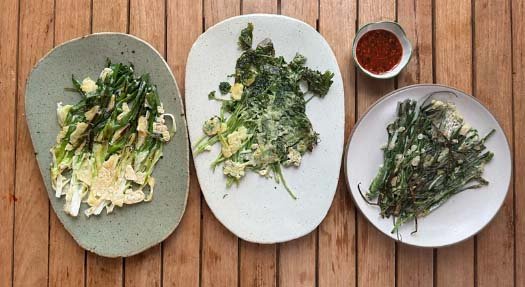
Every year, millions of people celebrate the founder of Buddhism’s birth by enjoying free meals at temples.
After the cherry blossom petals fall, strings of paper lanterns begin to appear across South Korea, dangling from trees and lacing the streets to announce the arrival of Buddha’s birthday. Temple visitors are greeted with a kaleidoscope of colour on the day of the celebration – which has been recognised as a national holiday for nearly 50 years in South Korea, where 16% of the population is Buddhist – and can often enjoy a free bowl of sachal bibimbap (temple bibimbap) packed with seasonal vegetables representing ohbangsaek, the five colours of the Universe (after braving the long lines, that is).
A celebration of springtime, Buddha’s birthday will take place on 15 May this year, with millions of people in Korea expected to come together to commemorate the birth of Siddhartha Gautama, the wandering ascetic and religious teacher who founded Buddhism in the 6th or 5th Centuries BCE.
[jump to recipe]From thousands of miles away, chef Ji Hye Kim is creating her own iteration of temple bibimbap in Michigan.
Born in Seoul, Kim remembers sitting around the table pinching the edges of mandu (dumplings) and slurping down a warm bowl of red bean porridge to mark Dongji, the winter solstice. She held onto those early memories as she immigrated to the United States as a young teenager, and later when she opened her Ann Arbor restaurant, Miss Kim, in 2016.
“But I felt a void in what I was doing,” Kim said. She could glide through cookbooks written in Korean, handpicking recipes to test. But the ingredients in front of her seemed to stare back in silence as she found her adult self unable to piece together the story of the dishes she grew up eating.
Burying herself in historical Korean cookbooks, Kim fell down a rabbit hole that led her to discover Buddhist nuns and priests who found a way to prepare a version of kimchi that omitted saewoo-jut (the salted, fermented shrimp prized for its savoury umami) and instead leveraged simplicity to deepen its flavours.
“It’s difficult to separate fish sauce or saewoo-jutout of kimchi,” said Kim. But after seeing that it was possible, Kim began to see how “food evolves over time, and [how] it evolves with the people who cook it and [with] what’s available” – a moment she described as “liberation”.
 Weekly Bangla Mirror | Bangla Mirror, Bangladeshi news in UK, bangla mirror news
Weekly Bangla Mirror | Bangla Mirror, Bangladeshi news in UK, bangla mirror news







